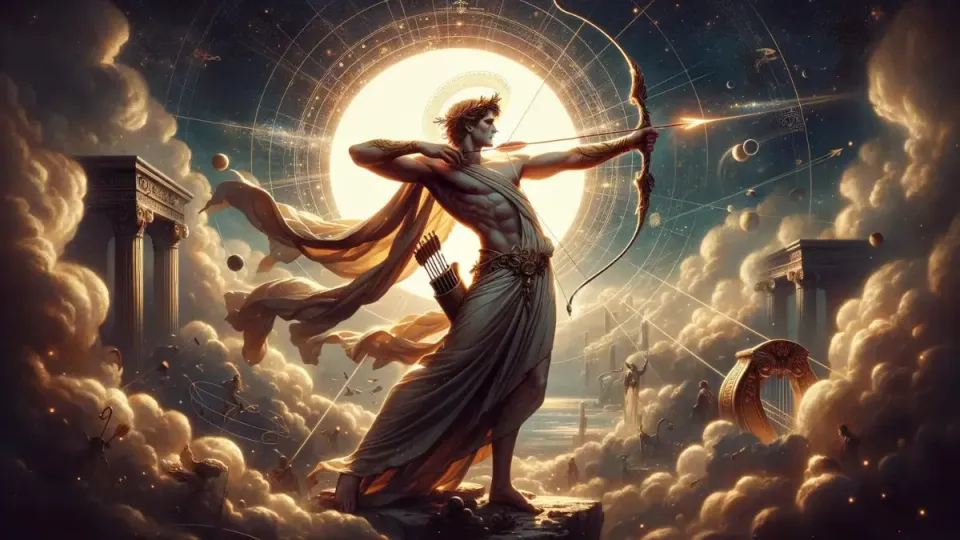Apollo Part I

Apollo is one of the most important and complex deities in Greek mythology, revered as an Olympian god with a wide range of attributes and responsibilities. He is the son of Zeus and the Titan Leto, and the twin brother of Artemis, goddess of the hunt.
Domains and Responsibilities
Apollo is associated with numerous aspects of life and nature:
- Sun and Light: He is often portrayed as the god of the sun and light, sometimes overlapping with or replacing Helios in this role.
- Music and Poetry: Gifted with a lyre by Hermes, Apollo became the god of music and poetry.
- Prophecy and Oracles: After slaying the Python at Delphi, Apollo became the patron god of prophecy and oracles.
- Healing and Medicine: Known as "The Healer," Apollo taught humans the art of medicine.
- Archery: He is renowned for his skill with the bow and arrow.
- Agriculture: Apollo is connected to crop growth and protection of herds.
Appearance and Symbolism
Apollo embodies the Greek ideal of kalokagathia, representing a unity of physical beauty and moral excellence. He is often depicted as:
- A beardless, athletic young man (kouros)
- Having golden hair, symbolizing his connection to the sun
- Wearing a laurel wreath
Animals sacred to Apollo include the dolphin and swan. The laurel tree is also associated with him.
Mythology and Legends
Several important myths and stories involve Apollo:
- Birth on Delos: Apollo and Artemis were born on the island of Delos.
- Slaying of Python: Apollo killed the serpent Python at Delphi, establishing his oracle there.
- Niobe's children: Apollo and Artemis slew Niobe's children as punishment for her hubris.
- Trojan War: Apollo played a significant role in the Trojan War, including guiding Paris's arrow to kill Achilles.
Worship and Influence
Apollo was widely revered throughout the ancient Greek and Roman world:
- The Temple of Apollo at Delphi was a major religious center.
- He was worshipped as a patron of the arts, with the nine Muses as his companions.
- Apollo's oracle at Delphi was consulted for important decisions and prophecies.
Apollo's influence extended beyond Greece, as he was later adopted into Roman mythology, maintaining his importance and many of his attributes.
While Apollo is well-known for his major myths, there are several lesser-known stories that showcase different aspects of his character and divine roles. Here are some intriguing, less-familiar myths about Apollo:
The Cattle Thief and the Lyre
Contrary to popular belief, Apollo did not invent the lyre. In a lesser-known myth, it was actually Hermes who created this instrument. As a newborn, Hermes stole Apollo's sacred cattle. When Apollo discovered the theft, Hermes offered him the newly-invented lyre as a peace offering. Apollo was so entranced by the instrument that he exchanged his entire herd for it5. This myth highlights Apollo's deep connection to music and his ability to appreciate beauty, even when it comes from an unexpected source.
Apollo's Servitude to King Admetus
After killing the Cyclopes who forged Zeus's thunderbolts (in retaliation for Zeus slaying Apollo's son Asclepius), Apollo was punished by being sent to earth as a mortal. He served King Admetus of Pherae in Thessaly as a herdsman. This lesser-known myth shows a more humble side of Apollo and demonstrates that even gods can face consequences for their actions.
The Musical Contest with Pan
In a less-famous musical competition, Apollo faced off against Pan, the god of the wild. King Midas was chosen as the judge. When Midas declared Pan the winner, Apollo, unable to accept defeat, punished the king by giving him donkey ears. This myth illustrates Apollo's competitive nature and his sometimes petty reactions to perceived slights.
Apollo and Hyacinthus
While Apollo's romantic pursuits are often mentioned, the tragic tale of his love for the Spartan prince Hyacinthus is less commonly known. Apollo and Zephyrus, the god of the west wind, both vied for Hyacinthus's affection. During a discus-throwing contest, Zephyrus, out of jealousy, caused Apollo's discus to strike and kill Hyacinthus. Grief-stricken, Apollo transformed the youth's blood into the hyacinth flower. This poignant myth reveals Apollo's capacity for deep love and sorrow.
Apollo's Sacred Cows
Many are unaware that Apollo was also associated with animal husbandry. He kept a herd of sacred, bright red cows, considered the finest cattle in the world. This lesser-known aspect of Apollo connects him to more earthly concerns and showcases his role as a protector of herds and agriculture.
These lesser-known myths provide a more nuanced view of Apollo, revealing his complexity as a deity who embodied not just divine perfection, but also very human traits like competitiveness, vulnerability, and the capacity for both great love and petty vengeance.
Member discussion